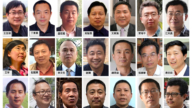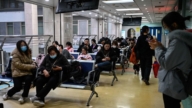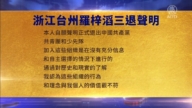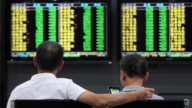【新唐人2012年8月8日讯】现任中共政治局常委、国家副主席的习近平,被认定是胡锦涛的接班人,行事向来低调,不过,有不少人看好习近平,尤其肯定他在治理浙江时的所谓“浙江模式”。有媒体分析,习近平的“浙江模式”有可能是他未来施政的方向,然而经济学者认为,在中共体制下,再好的模式是否能够实施?还是个问号。
在习近平被选为中央政治局常委开始,就被外界猜测,是中共中央内定继胡锦涛之后的下一任中共中央总书记。依据北京的程序,习近平将于今年秋天的中共18大,接替胡锦涛成为中共总书记,然后在明年三月份全国人大换届时,成为国家主席。
香港《开放》杂志评论文章报导,在中国各路诸侯施政之争中,除了汪洋的“广东模式”,薄熙来的“重庆模式”,实际还存在一个习近平治理浙江时的“浙江模式”,报导说,这有可能成为习近平未来施政的方向。
文章认为,“浙江模式”就是政府多服务少干预,逐渐走向“小政府大社会”的模式。而在官方的宣传中,所谓“浙江模式”,是指国家支持以“中小民营企业为主”的经济发展体系。
对此,美国“南卡罗莱纳大学艾肯商学院”教授谢田表示,中国的中小企业在过去三十年来,一直都在力图大规模发展,但是过程中常常受到来自国有企业的限制。
美“南卡罗莱纳大学艾肯商学院”教授谢田:“因为最主要的资源和企业呢,包括那些交通、电力、银行,这些最重要的企业,都被中共利益集团给控制垄断着,那么这些小企业在发展过程中,在不可避免的需要财务金融的服务,电信的服务和交通运输的服务,那么他们也会受到限制。”
谢田表示,中国大陆的国有企业与私营企业的待遇,不管是融资、政府政策、税收等等,都存在着不平等。
报导说,当年习近平在福建任职时,就对政府的定位与角色问题有独特的见解。他认为:政府要做有限的政府,政府应有所为,有所不为,把自己定位准确,把主要精力放在自己该管好的事情上,把那些自己不该管、也管不好的事情还权于社会,还权于企业。
谢田:“在中共一党专政的体制之下,再好的模式我看也没有什么太多的希望,看起来挺好,但是能不能实行,能不能够实施,在中共这个体制之下能不能够实施,我看还是最大的问号。”
两年前维基解密披露美国密电,指习近平是个“好人”,不贪钱、不贪污、不好女色。《开放》杂志引述北京消息人士的分析也指出,习近平应该比胡锦涛更有担当和有分寸,面对异议对抗时,采用铁腕镇压的可能性也会低一些。
谢田:“中共的领导人,他没有当上第一领导人的时候,他可能有更好的愿望有更好的愿景,但在这个体制下,整个共产党是一个非常邪恶残暴的体制,他一旦坐上第一领导人位置的时候,他知道他的权力来源,都是来自于共产党这个整个体系,是共产党给予他这么多的权力,所以实际上很难跟共产党决裂,去放弃现在这个到手的既得利益。”
谢田认为,下一代的中共领导人未来会怎么走,会不会出现象前苏共领导人叶尔钦、戈尔巴乔夫一样的人物,把苏共解体掉,现在还很难确定。
采访/陈汉 编辑/黄亿美 后制/郭敬
What Is the Future of Xi Jinping’s “Zhejiang Model”?
Xi Jinping is considered to become successor of Hu Jintao.
Xi Jinping is Vice-President and the member of Politburo
Standing Committee, and has always had a low profile.
Many people are optimistic towards his political career,
especially the “Zhejiang Model” that he has created.
Some media outlets have even analyzed that the
“Zhejiang Model” will be the direction for his future policy.
Economists think that under the Chinese Communist
Party’s (CCP) system,
however, the question remains of whether
a good model can be implemented.
Following Xi Jinping’s selection as a member
of the Politburo Standing Committee,
many people suspected the CCP Central Committee had
decided Xi will become the next General Secretary of CCP.
According to the CCP process, Xi Jinping will succeed
Hu Jintao to become General Secretary during the 18th National Congress, which will take place this autumn.
He will then become the President in the National
People’s Congress (NPC), which will be held next March.
Hong Kong-based magazine “Open”
reported on the situation.
In addition to Wang Yang’s “Guangdong Model”, and recently
ousted Bo Xilai’s “Chongqing Model”, there is another model.
This model is called the “Zhejiang Model”, which was created
by Xi Jinping during his tenure in Zhejiang province.
The report states the “Zhejiang Model” might
become the future policy direction of Xi Jinping.
The report said that in “Zhejiang Model”, the government will
serve the people more, and interfere with the people less.
Society will move towards a model
of “small government, big society”.
In official propaganda, the so-called “Zhejiang Model"
develops a system in which the “state supports a small and medium-sized private enterprise”-based economy.
Xie Tian, a professor at the Aiken School of Business,
University of South Carolina U.S. commented.
In China over the past 30 years, small
and medium-sized companies tried to grow.
They were always restricted
by state-owned enterprises.
Xie Tian: “Because the CCP controls the main resources and
enterprises, including transportation, electricity and banking.
All the most important enterprises are controlled by the CCP.
But small and medium-sized companies have to face
the financial services, the telecommunications services and transportation services. They are restricted.”
Xie Tian said that in China, state-owned enterprises enjoy
different services in comparison with private enterprises.
This includes financing, political policies, taxes etc.
There are inequalities in all these areas.
It’s reported that when Xi Jinping was in office in Fujian
Province, he gave special positioning to the government.
Xi thought the government could only play a limited role,
meaning it must do some things, and not do other things.
In positioning itself to accurately focus energy
on the things that it should do,
it should place the things that it should not control
in the hands of society, granting power to companies.
Xie Tian: “Under the CCP dictatorship,
there’s no hope, even with a better model.
It looks good, but it remains a question whether it can
be implemented, and whether it can be put into action.
Under the CCP regime, I have the biggest
doubt of whether it can be implemented.”
Two years ago, Wikileaks disclosed a secret U.S. message.
It said Xi Jinping is a “good person”, who is not greedy
for money, not corrupt or sexually deviant.
Hong Kong’s “Open” magazine quoted a Beijing
source, which compared him with Hu Jintao.
Xi Jinping should be more accountable.
He may use less iron-fisted repression on dissidents.
Xie Tian: “For CCP’s leaders, they may have wishes
for a better future before they are on board.
But the CCP is a very evil organization.
Once a person takes the position of leader,
he knows his power is from the whole CCP system.
It is the CCP that gives him such strong power.
So, it’s very hard for the person to separate himself
from the CCP, and for him to lose his vested interests.”
Xie Tian thinks it’s very hard to say which style
of leadership the next CCP leader will take.
It’s hard to say whether he will be like another Boris Yeltsin
or Gorbachev, leaders of the former Soviet Communist Party.

























